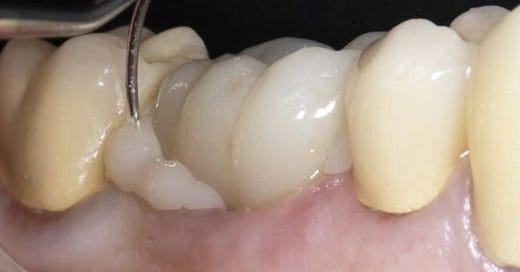What If Dental Bonding Falls Off?
Dental bonding cement securely attaches restorations like crowns or veneers to teeth, ensuring durability and a natural look.
Patients often worry, what if dental bonding falls off unexpectedly? Dental bonding is a popular cosmetic procedure used to repair chipped, discolored, or slightly misaligned teeth. While it is generally durable, it is not indestructible. Factors like biting hard objects, poor oral habits, or normal wear over time can lead to Dental Bonding Cementing detachment. Knowing what to do when this happens can prevent discomfort, protect your teeth, and avoid further damage. Immediate care and professional follow-up are key to restoring both function and appearance.
Common Reasons Dental Bonding Comes Loose:
Dental bonding is applied using a special resin that is hardened with a curing light. Though effective, this material is more susceptible to chipping or falling off compared to permanent solutions like crowns or veneers. Understanding the typical causes helps you avoid repeat issues and protect your dental work in the future.
Bonding may fall off due to:
Biting on hard foods like ice, nuts, or hard candy
Using teeth as tools to open bottles or packages
Teeth grinding (bruxism) especially at night
Natural wear and aging of the bonding material
Trauma or impact from sports or accidents
Poor bonding technique or rushed application
Regular dental checkups can help detect early signs of weakening, giving you a chance to act before complete failure occurs.
What You Should Do Immediately?
If your dental bonding falls off, it's essential not to panic. Acting quickly and appropriately will reduce the risk of damaging the exposed tooth and increase the likelihood of a smooth repair. While it may not be an emergency, it does require prompt attention.
Steps to follow when bonding comes off:
Locate the fallen piece if possible, and store it safely
Rinse your mouth gently with warm water to clear debris
Avoid chewing on the affected side of the mouth
Apply dental wax or temporary material if the area is sharp
Call your dentist to schedule a repair appointment
Avoid using over-the-counter adhesives, as they can cause damage or interfere with proper bonding during repair.
Risks of Delaying Treatment:
Ignoring a broken or detached bonding can lead to serious complications. Dental bonding not only improves aesthetics but also protects damaged or vulnerable parts of the tooth. Leaving a tooth exposed increases the risk of decay, pain, and other oral health issues.
Possible consequences of untreated bonding failure:
Increased tooth sensitivity to hot, cold, or sweet substances
Decay or infection due to exposed dentin
Gum irritation or swelling around the affected tooth
Cracking or further chipping of the unprotected tooth
Misalignment or uneven bite due to missing material
Prompt repair not only saves your tooth but may also reduce the need for more expensive treatments down the line.
How Dentists Repair Fallen Bonding?
The process of repairing fallen Dental Bonding Cementing Treatment is usually straightforward, especially if the tooth underneath remains intact. Your dentist will examine the area, clean it thoroughly, and reapply the bonding material to match the surrounding teeth.
Typical steps in the repair process include:
Assessment of the tooth for underlying damage or decay
Removal of old bonding remnants to ensure a clean surface
Etching and preparation to improve adhesion
Application of composite resin in layers
Shaping and curing the material with UV light
Final polishing for smoothness and natural appearance
In some cases, your dentist might recommend upgrading to a stronger or more permanent option like veneers if the same area fails repeatedly.
Tips to Prevent Future Bonding Failures:
Once you’ve had the bonding repaired, it’s important to take preventive steps to maintain it. Though dental bonding is not permanent, proper care can extend its life significantly. Small changes in habits can make a big difference.
To keep your bonding intact:
Avoid hard or sticky foods that put pressure on bonded teeth
Use a night guard if you grind your teeth while sleeping
Brush and floss daily to maintain overall oral hygiene
Visit your dentist regularly for checkups and cleanings
Don’t use your teeth to open objects or bite non-food items
By taking care of your bonding, you’ll preserve your smile and avoid repeat dental visits for the same issue.



